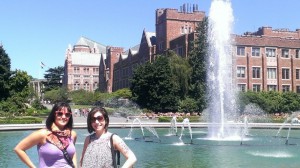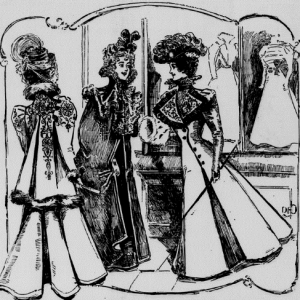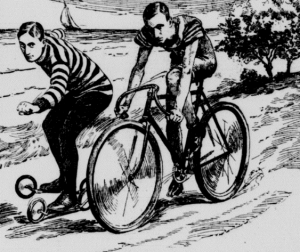An MLIS student reports on her experience working on the National Digital Newspaper Program
The Washington State Library participates in the National Digital Newspaper Program (NDNP), sponsored by the National Endowment for the Humanities and Library of Congress. Shawn Schollmeyer, the NDNP coordinator for our state, has had the pleasure of working this past year with two recent MLIS graduate students at the University of Washington, Rachel Foshag and Loryn Lestz.

2013-14 NDNP Washington Contributors and recent UW MLIS graduates, Rachel Foshag & Loryn Lestz, outside Suzzallo Library and Mary Gates Hall.
Over the last two years Loryn and Rachel worked on the evaluation of the newspapers for condition and missing pages as well as adding in metadata required by the Library of Congress before the pages could be exported and loaded onto hard drives to ship off to the Library of Congress. They were essential in preparing the materials for us and our collaboration with University of Washington Microfilm and Newspaper department also helped make the program a success. As a final exercise Shawn asked if they would write a blog post about their experience. We thank them for their hard work.
The following is written by Loren Lestz.
Working on Washington’s National Digital Newspaper Program has been a great way to expand my horizons and skill-set in the Library and Information Science field. Over the course of this past year, I had the opportunity to be involved in many of the steps in the process of taking our content from microfilm to online digital resource. That involvement gave me not only a broad understanding of NDNP’s domain, but also a deep appreciation for what the resources produced by this project offered to their future users.
Getting to be involved in so many different processes within the NDNP project also provided me with a high-level understanding of the importance of each step – no matter how simple it might seem at first glance. Working with the Washington Standard really emphasized this for me, as I was took part in every step we performed on that title in the UW office at one point or another. 
More recently, as our work has shifted from processing to promoting the collections, I have gained an appreciation of what it’s like to use the end products that I had been working so hard on. One of these projects has involved going through all of the titles contributed over the course of Washington’s three NDNP grant cycles to find illustrations and photographs highlighting themes from Washington’s early history to be added to Washington State Library’s Pinterest account. This process (while of course very fun) has been quite lengthy, but when I am able to do keyword searches that rely on the OCR I helped to correct it really makes me appreciate the work myself, the rest of the student specialists, and WSL’s volunteers have put into this project over the years. I’ve especially had fun filling up the fashion and bicycling boards – two hobbies of mine outside of work.
Serendipitously enough, I have also even been able to help form a connection between another digital humanities project and NDNP’s resources. In January of this year, I started working with the Early Seattle Theatre History project. ESTH’s goal is to help academic researchers from high school to graduate school to find connections between the various kinds of digitized resources relating to Seattle’s theatre history.  When I joined the team, ESTH’s existing team members had just begun exploring the ways in which they could connect researchers with digitized newspaper reviews in addition to the photographs and programs already in the ESTH collection. I was able to introduce them to NDNP’s resources, which have turned out to be perfect for what they needed to do.
When I joined the team, ESTH’s existing team members had just begun exploring the ways in which they could connect researchers with digitized newspaper reviews in addition to the photographs and programs already in the ESTH collection. I was able to introduce them to NDNP’s resources, which have turned out to be perfect for what they needed to do.
Not only am I very proud of what I have helped to produce while at NDNP, I am also very grateful for the opportunities I have had to develop valuable skills that will serve me well as I start down my new, post-grad school career path.  The experience of working with the same set of content throughout a good chunk of its life cycle has given me insights that I know I will be able to draw on in future projects – both as best practices and as lessons learned.
The experience of working with the same set of content throughout a good chunk of its life cycle has given me insights that I know I will be able to draw on in future projects – both as best practices and as lessons learned.
As I wrap up my work on the project, I am both proud of what my co-workers and I have accomplished as part of NDNP and excited for the work that Washington State Library will be able to do with the rest of its newspaper collection as a result of our successes with NDNP.
You can follow any responses to this entry through the RSS 2.0 feed. Both comments and pings are currently closed.





